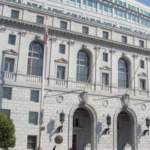Berkeley Law professors are prolific, insightful scholars with broad and significant influence felt well beyond the school’s walls through their research, legal advocacy, policymaking and commentary.
New Research

California Constitution Center Scholars Weigh in On National Guard Mobilization
California Constitution Center Executive Director David A. Carrillo ’95 and Senior Research Fellow Brandon V. Stracener wrote amicus curiae briefs supporting Gov. Gavin Newsom’s lawsuit against the Trump administration seeking a restraining order to return control of the state’s National Guard to the governor.
Exposing the Flaws of ‘Excited Delirium’
In a new article in the Harvard Law Review, Professor Osagie K. Obasogie scrutinizes how the concept of “excited delirium” — characterized as a psychiatric response that produces such severe agitation that a person could spontaneously die — has become a problematic diagnosis that’s often used to absolve law enforcement officers from responsibility when suspects die in their custody.
Albiston Cited in Supreme Court Opinion
A 2007 UCLA Law Review article by Professor Catherine Albiston J.D. ’93 Ph.D. ’01 was cited in a recent U.S. Supreme Court opinion. In a 7-2 decision in Lackey v. Stinnie, the Court held that plaintiffs who won preliminary injunctive relief in a civil rights enforcement action under Section 1983 that later became moot cannot obtain attorney fees as prevailing parties.
Should the Stored Communications Act Trump California Law?
UC Berkeley Law Dean Erwin Chemerinsky, Professor Rebecca Wexler, and Criminal Law & Justice Center Executive Director Chesa Boudin recently filed an amicus curiae brief in a case now before the California Supreme Court that turns on whether a federal law prevents criminal defendants from subpoenaing evidence they need to defend themselves.
Center Hosts Powerhouse Conference
UC Berkeley Law’s Center for Private Law Theory recently hosted the North American Workshop on Private Law Theory for the first time, welcoming a stellar group of scholars from around the world to discuss research works in progress. The workshop’s 11th annual meeting included the revival of its John G. Fleming Award, given to University of Toronto Professor Ernest Weinrib for his tort law contributions.









